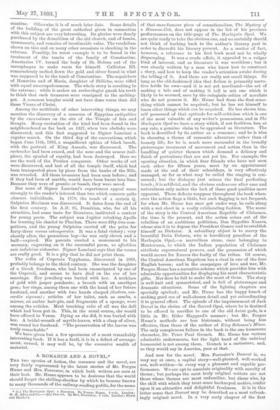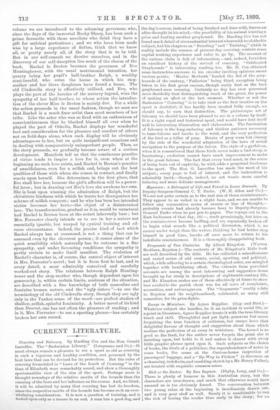A ROMANCE AND A NOVEL.* THE two species of fiction,
the romance and the novel, are very fairly represented by the latest stories of Mr. Fergus Hume and Mrs. Forrester, in which both writers are seen at their best. Mr. Hume appears to he desirous that the world should forget the shilling-shocker by which he became known to many thousands of the railway-reading public, for the name (1.) The Harlequin Opal : a Romance. By Fergus Hume. 8 vols. Loudon W. H. Allen and Co.—(2.) Dourest. By Mrs. Forrester. 3 vols. Loudon: llurst and Blaokott. of that once-famous piece of sensationalism, The Mystery of a Hansom-Cab, does not appear in the list of his previous performances on the title-page of The Harlequin Opal. We are quite ready to take the obvious cue, and we certainly should not think of harking back to the author's literary past in order to discredit his literary present. As a matter of fact, however, a reference to his first book need not be wholly disparaging. It was a crude affair, it appealed to a vulgar kind of interest, and as literature it was worthless ; but it was clearly written by a man who knew how to construct a story, and how to keep the reader's attention awake during the telling of it. And these are really not small things. So long as the old-fashioned idea that fiction is primarily narra- tive holds its own—and it is not yet moribund—the art of making a tale and of making it tell is not one which is likely to be scorned, save by the eulogistic critics of novelists who do not possess it. Mr. Hume had from the first some- thing which cannot be acquired ; but he has set himself to learn other things which can be acquired. He has shown him- self possessed of that aptitude for self-criticism which is one of the most valuable of any writer's possessions, and in The Harlequin Opal we have a story which, if not faultless, has, at any rate, a genuine claim to be appraised as literature. The book is described by its author as a romance; and he is wise in choosing a theme of romantic adventure rather than of homely life, for he is much more successful in the broadly picturesque treatment of movement and action than in the handling of quieter themes whieh demand a delicacy and finish of portraiture that are not yet his. For example, the opening situation, in which four friends who have not seen each other for fifteen years, meet by an appointment made at the end of their schooldays, is very effectively managed, so far as what may be called the staging is con- cerned; but the dialogue just misses the final perfecting touch; it is artificial, and the obvious endeavour after ease and naturalness only makes the lack of these good qualifies more apparent. These defects reappear throughout the book when- ever the action flags a little, but such flagging is not frequent, for when Mr. Hume has once got under way, he sails along with a wet sheet in a really exhilarating fashion. The scene of the story is the Central American Republic of Ololacaca, the time is the present, and the action arises out of the rebellion of an ambitious politician, Don Hypolito Xuares, whose aim it is to depose the President Gomez and to establish himself as Dictator. A subsidiary object is to marry the beautiful Doiia Dolores, who is hereditary guardian of the Harlequin Opal,—a marvellous stone, once belonging to Montezuma, to which the Indian population of Clolacaca attribute supernatural powers, and the possession of which would secure for Xuares the fealty of the tribes. Of course, the Central American Napoleon has a rival in one of the four English heroes; and in the campaigns of love and war, Mr, Fergus Hume has a narrative-scheme which provides him with admirable opportunities for displaying his most characteristic gifts. Nor does he fail to make the most of them. The story is well-knit and symmetrical, and is full of picturesque and dramatic situations. Some of the fighting chapters are specially spirited ; and Mr. Hume has the happy knack of making good use of well-chosen detail and yet subordinating it to general effect. The episode of the imprisonment of Jack Duval in the shrine of the Sacred Opal, where he is destined to be offered in sacrifice to one of the old Aztec gods, is a little in Mr. Rider Haggard'a manner ; but Mr. Fergus Hume's methods are less histrionic, without being less effective, than those of the author of King Solomon's Mines. The only conspicuous failure in the book is the one humorous character, Dr. Peter Paul Grench. Mr. Hume has various admirable endowments, but the light hand of the satirical humourist is not among them. Grench is a caricature, and, as they would say in America, poor at that.
And now for the novel. Mrs. Forrester's Dearest is, we may say at once, a capital story—well-planned, well-worked out, well-written—in every way a pleasant and capable per- formance. We are apt to associate originality with novelty of theme ; but perhaps the most truly original writers are not those whose themes are most unfamiliar, but those who, by the skill with which they treat some hackneyed motive, confer upon it an attractive and delightful freshness. It is in this latter sense that Dearest may be described as a most refresh- ingly original novel. In a very early chapter of the first volume we are introduced to the scheming governess, who, since the days of the immortal Becky Sharp, has been such a prime favourite with those novelists who think they have a gift for satirical portraiture ; and we who have been made wise by a large experience of fiction, think that we know all, or pretty nearly all, of the story that is to be told. But in our self-conceit we deceive ourselves, and in the discovery of our self-deception lies much of the charm of the book. Rachel le Breton becomes the governess of Eve Huntingtower, with the usual matrimonial intention, her quarry being her pupil's half-brother Ralph, a wealthy semi-invalid, who owns the house in which his step- mother and her three daughters have found a home. The old Cinderella story is effectively utilised, and Eve, who plays the part of the heroine of the nursery legend, wins the sympathy of her half-brother, to whose action the introduc- tion of the clever Miss le Breton is mainly due. For a while the action proceeds in the usual fashion, though we soon see that Rachel is a much finer artist than most members of her tribe. Like the actor who was so fired with an enthusiasm of conscientiousness that he blacked himself all over when he played the part of Othello, Rachel displays her wonderful tact and consideration for the pleasure and comfort of others not on field-days alone, when such display will be obviously advantageous to her, but on quite insignificant occasions and in dealing with comparatively unimportant people. Then, as the story proceeds, we gradually become aware of a curious development. Moralists tell us that the continuous practice of virtue tends to inspire a love for it, even when at the beginning no such love exists, and Rachel le Breton's practice of unselfishness, even for a selfish end, brings out the best qualities of those with whom she comes in contact, and finally reacts upon herself. She determines, in the first place, that Eve shall love her, because the girl's affection will be a power- ful lever; but in drawing out Eve's love she awakens her own. She is bent upon winning the admiration of Ralph, but the chivalrous kindness with which he treats her disorganises her scheme of selfish conquest ; and he who has been her intended victim becomes her hero,—the object of a disinterested love. The transformation, gradual as it is, would be unnatural had Rachel le Breton been at the outset inherently base ; but Mrs. Forrester clearly intends us to see in her a nature not essentially ignoble, but warped by cynical training and ad- verse circumstance. Indeed, the precise kind of tact which Rachel always has at command, is not a thing that can be assumed even by the cleverest person ; it comes alone of the quick sensibility which naturally has its outcome in a fine sympathy, and under favouring conditions the sympathy is pretty certain to make itself manifest. The evolution of Rachel's character is, of course, the central object of interest in Mrs. Forrester's novel; but it is from first to last, and in every detail, a most admirably conceived and carefully worked-out story. The relations between Ralph Hunting- tower and the step-mother who, though dependent upon his generosity, is, within certain limits, mistress of the situation, are described with a fine knowledge of both masculine and feminine human nature, and the "ugly sisters "—to use the terminology of the old Cinderella story, though they are ugly only in the Yankee sense of the word—are perfect studies of shallow, selfish, spiteful femininity. A better novel of its kind than Dearest, one has not often the pleasure of reading ; and in it, Mrs. Forrester—to use a sporting phrase—has certainly broken her own record.



































 Previous page
Previous page